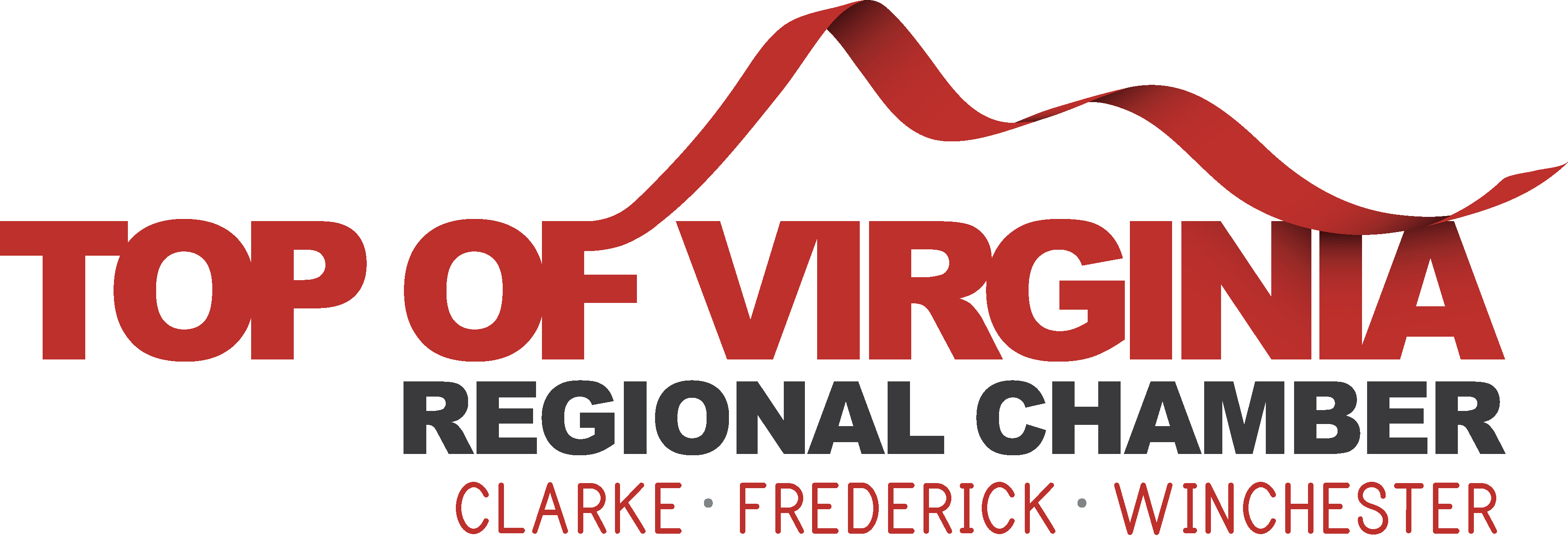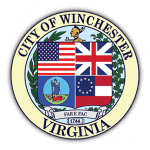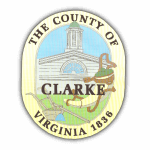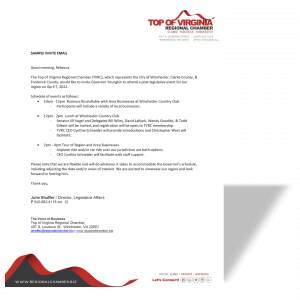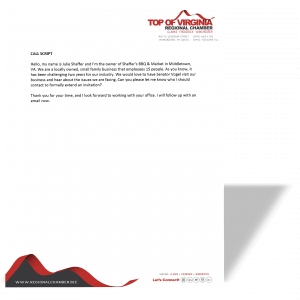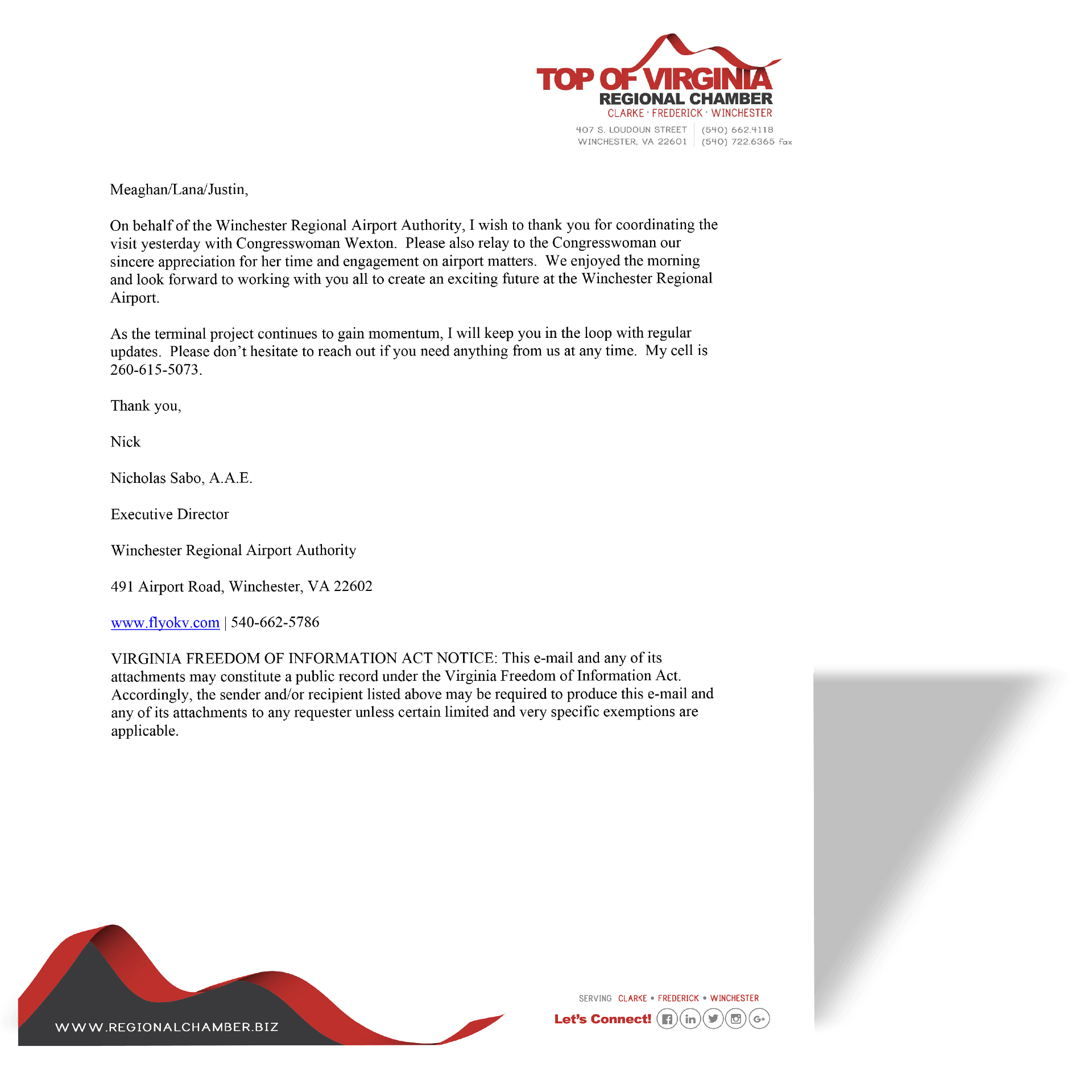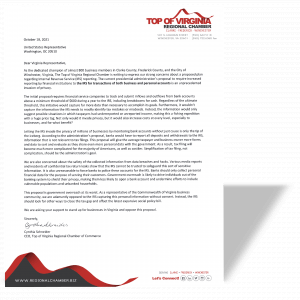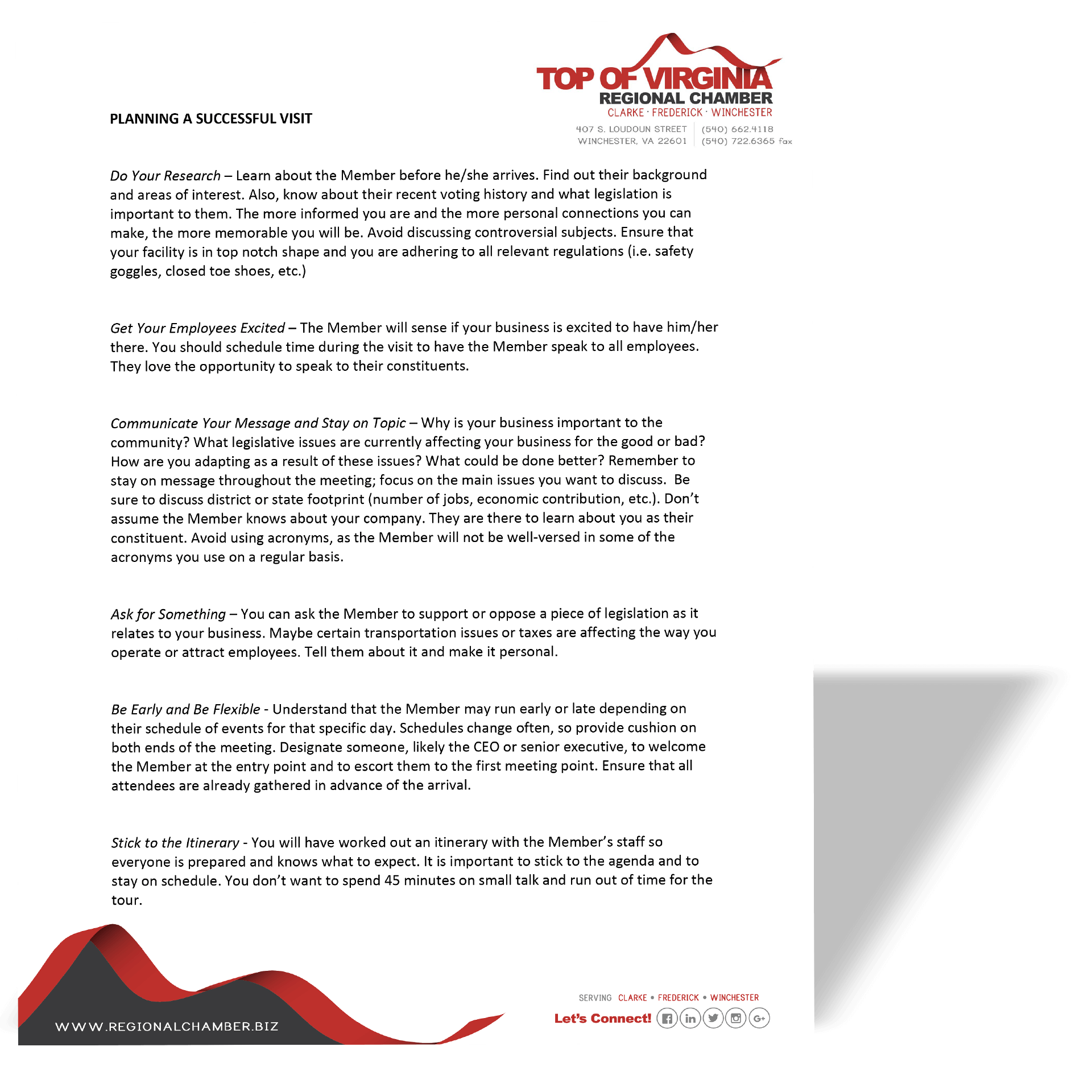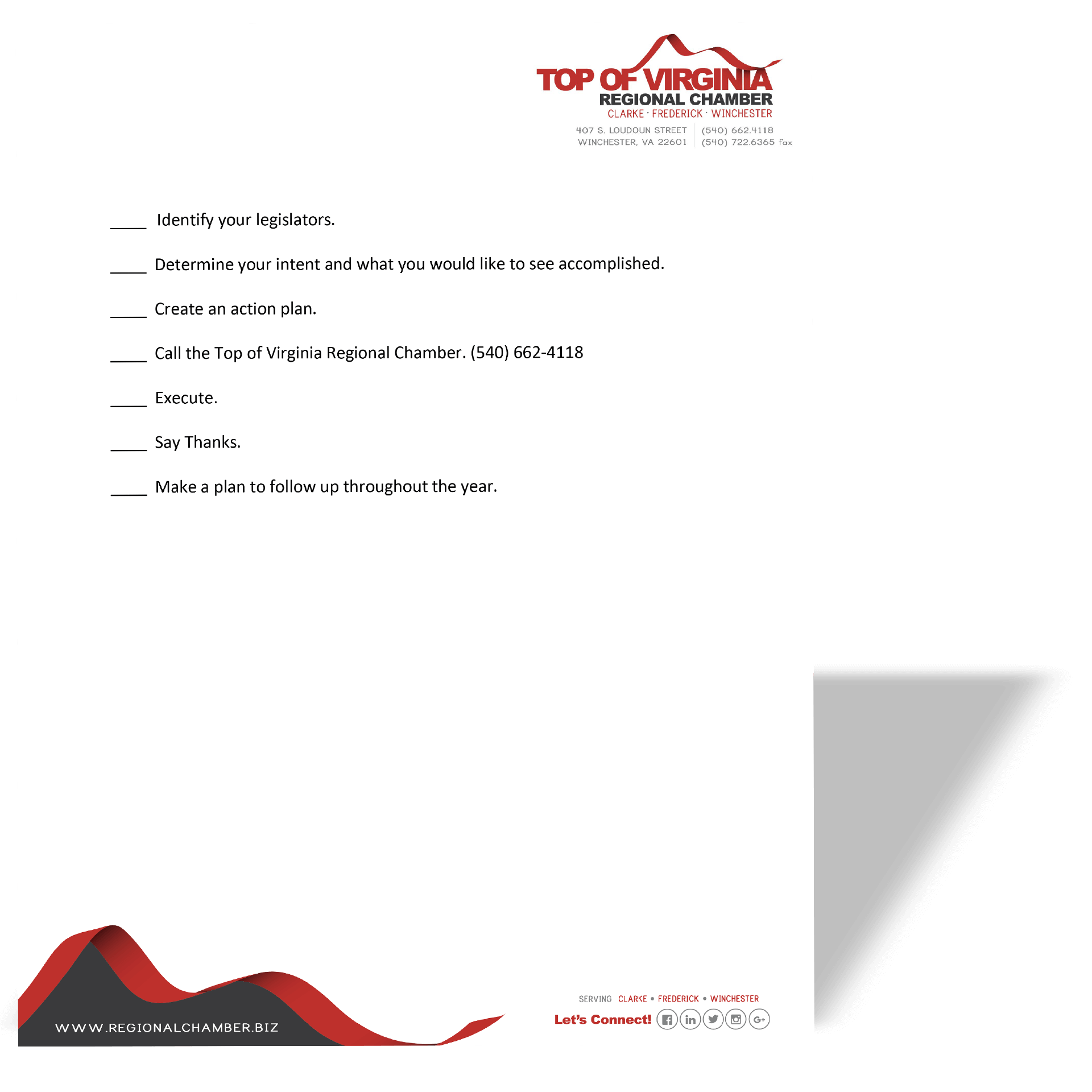Table of Contents
- Effective Grassroots Advocacy
- What is Grassroots Advocacy?
- Why is Grassroots Advocacy Important?
- Tools for Effective Grassroots Advocacy
- Dos and Don’ts
- In-Person Meeting with Elected Officials
- General Tips for Legislative Advocacy
- Sample Advocacy Letters
- Steps for Hosting a Visit with an Elected Official
- Planning a Successful Visit
- Invite Email
- Call Script
- Thank you Email
- Elected Officials in the Top of Virginia Regional Chamber Jurisdiction
- Chamber Specific Information
- Plan of Action Checklist
Grassroots Advocacy
“Grassroots advocacy” is the process of contacting elected officials in relation to important policy issues. “Advocacy” is defined as advocating, speaking, or writing in support of something. An “advocate” is a person who speaks or writes in support of something. Under this definition, we are all advocates. Grassroots advocates raise public awareness on issues to influence public perception, regulations, and public policy.
2025 Legislative Priorities
The Top of Virginia Regional Chamber is focused on strengthening businesses in the City of Winchester, Clarke County, and Frederick County, Virginia, and fostering an environment in which businesses and community can thrive. The goal is to make our region a better place for all who work, live, and do business here. In order to elevate the voice of business, TVRC supports the following policy positions:
Transportation/Infrastructure
- Sustaining a robust public infrastructure, focusing on improvements to I-81 and regional upgrades.
- Our members cited location, including proximity to Northern Virginia/Interstates, Dulles International Airport, & the Inland Port, as one of the top benefits to having a business in this region, and it is important that we continue to invest in these strengths.
- The Winchester Regional Airport is another great asset, and we continue to support its growth.
- Enhancements to local transportation should continue to be studied and prioritized.
Workforce Solutions
- Focusing on workforce challenges such as childcare, mental health, education, & housing and continuing to align business needs with relevant training.
- The worker shortage continues to impact almost every industry, contributing to higher prices, supply chain woes, and production slowdowns.
- Access to affordable childcare and housing are major barriers to recruiting and retaining reliable workers and should be prioritized.
- Our community embraces the leadership role that businesses and industry leaders play in ensuring the quality of instruction, programs, and results from our K-12 schools and workforce training programs
- Increased investment in mental health, including the youth, will also support the workforce. All local law enforcement and hospitals support increased funding in this area.
- Minimum wage should not be increased above the rate that was enacted during the 2020 session until the state studies the economic impact of any further escalations. The pandemic and resulting labor shortage have naturally increased wages, and as the government also continues to increase wages, small businesses struggle to compete.
- Government Collaboration
Building and maintaining strong synergy between local government and the business community, leading to proactive engagement on business policy, less regulations, and lower business and property taxes.- Continuing to prioritize economic development, including support for small- and medium-sized businesses and more business-friendly legislation, is critical to robust business growth.
The Top of Virginia Regional Chamber’s Board of Directors adopted these 2024 policy priorities following their development by the TVRC’s Public Policy Committee. We thank our members, the elected officials who represent our region, as well as senior government officials who have participated in events throughout the year to discuss issues facing our region. That support and insight assisted in the development of this legislative agenda. We look forward to continuing to collaborate with the community to elevate the voice of business in our region.
TOOLS FOR EFFECTIVE GRASSROOTS ADVOCACY
In-Person Meetings with Elected Officials
Dos and Don'ts
The following is a step-by-step guide for inviting your elected representatives to tour your facility. Note that state and local officials have a very small staff (if any), while federal officials have a whole team and multiple offices to navigate. This guide is not meant to address every scenario, and the TVRC team is happy to assist however we can along the way.
Hosting a Member is just the beginning of establishing a very valuable relationship. Make sure to keep in contact with the staffers, making them aware of any legislative issues that are currently affecting or could potentially affect your business. It’s important to strike a nice balance between staying in touch and not being overbearing.
The Top of Virginia Regional Chamber of Commerce Public Policy Positions:
The Public Policy Positons of the Top of Virginia Regional Chamber of Commerce are presented by the Chamber’s Public Policy Committee. As the Chamber seeks to demonstrate its ability to represent the business interest of our community, we have outlined general positions to assist our business community’s growth and the prosperity of our community.
The Chamber represents a diverse membership of large and small businesses and organizations. This diversity also provides diverse opinions on particular or specific issues. However, the Chamber is presenting positions which represent the greater organization with two requirements:
- Is it important to its member?
- Does it reflect the opinion of the clear majority of the business community?
We respect our members and understand some may disagree, however as issues evolve and the environment changes, positions may also change. With this evolution, the Chamber welcomes and encourages well informed discussions on the issues facing business. We also encourage the expression of various opinions from our members and participation with our Public Policy Committee.
GOVERNMENT REGULATION
Position Statement: The Chamber supports a reduction in harmful regulations placed by government upon businesses and generally opposes efforts to increase governmental regulations. The Chamber supports a reduction in the level of current government regulation, and opposes further regulatory action except in the most necessary of circumstances. Of course, the Chamber realizes there are limited circumstances in which it is necessary for the government to take regulatory action. The Chamber realizes governing officials strive to serve the legitimate needs of those by whom they are elected. However, no matter how important the goal, it is not wise or fair for the cost of measures meant to promote the general welfare to be borne solely or primarily by the business community. Thus, the Chamber hopes all parties will agree to strike a fair and just compromise.
TAXATION
Position statement: The Chamber supports a revenue system fostering a favorable business climate and encourages the economic development, which means taxes should be few in number and should not disproportionately burden one sector of the economy over another. Taxes administered should maintain a balance between tax growth, population growth and economic activity.
The Chamber supports local and state tax policy encouraging business opportunities and investments for general business. Industry-specific taxes should generally be avoided. Income taxes should not have a high marginal tax rate nor have excessive brackets. The Chamber supports a competitive sales tax rate applied to a broad base and designed to encompass true consumption. The Chamber also supports the continuation of the long-standing state policy of not placing a sales tax on goods acquired for production.
WORKFORCE DEVELOPMENT
Position Statement: The Chamber believes a strong education system and the availability of technically skilled people are vital to our region’s future prosperity and quality of life. Business has a critical role to play, in partnership with our educational institutions and those providing workforce training services, to ensure we have the talent to remain competitive.
The Chamber supports continued education and training at all levels, including pre-K-12 education, post-secondary education, adult literacy, vocational and certification programs, as well as on-the-job and customized training programs. The involvement of business in workforce development is essential to our attractiveness and effectiveness as a business location.
TRANSPORTATION
Position Statement: The Chamber supports increased long-term investment in transportation infrastructure to promote economic development and quality of life in the region.
Effective transportation systems are essential to continued economic growth and development in the upper Shenandoah Valley region as well as Virginia. All modes of transportation are becoming increasingly important to the prosperity, health, education. Safety, security, environment and overall quality of life--but the resources are not available to meet demands. The Chamber supports increased investment in transportation infrastructure and coordinated land-use planning, with appropriate emphasis and funding given to the Shenandoah Valley region, to support the growing economy and population. Further, the Chamber supports the development of a comprehensive, long-term solution addressing the following criteria: transportation safety and security; improvement in the mobility within and across all travel modes; community goals as it relates to economic development; maximizing transportation operations and efficiency in the region; and providing adequate funding for roadway maintenance, maintenance of secondary roads and balances concerns with respect to aesthetics.
INTERSTATE 81
Position Statement: The Chamber supports conservative, cost-effective solutions of improving Interstate 81.
The solution should be as least costly and as conservative as is required to meet the legitimate needs for upgrade, repair and improvement of Interstate 81. Solutions requiring expensive and wholesale changes along the length of Interstate 81 without justifying a need are not favored by the Chamber. The aesthetic beauty of our home region provides our residents with enjoyment and tourism is vital to our economy and livelihoods. Any solution should minimize the impact of construction and repair on our natural resources.
MINIMUM WAGE
Position Statement. The Chamber opposes any effort to establish a minimum wage higher than the federally mandated minimum wage for the Commonwealth of Virginia, or any of its localities.
The proponents of these so-called “living wage ordinances,” while perhaps well-meaning, ignore certain economic realities. First, these measures put the state or locality at a competitive disadvantage in comparison to its neighbors. Second, increases in the minimum wage intended to address poverty can actually have an adverse effect of increasing poverty by eliminating certain entry-level jobs. Finally, these “living wage” laws hurt both the businesses who must divert funds away from job creation and benefits to fund the mandate, and their employees who miss out on these benefits and opportunities. Instead, the Chamber encourages localities and businesses to focus on providing people with workforce training and advancement opportunities so employees can get the skills needed to advance in the workplace and earn more without a mandate.
HEALTHCARE
Position Statement: The Chamber supports public and private initiatives undertaken to ensure that high quality and affordable health care for the people living in the region can be sustained over time.
Delivery of health care locally should reflect cost efficiencies, accountability, and excellence in the delivery of services. We believe long term sustainability and viability of our businesses, both small and large, will be dependent upon management of health care costs. Affordability of medical care significantly affects the quality of life for people living in our region.
ECONOMIC DEVELOPMENT
Position Statement: The creation of jobs and economic prosperity through expansion of existing businesses and the attraction of new business activity to the area is a priority for the Chamber. Effective economic development includes removing unnecessary regulation, tax burdens and governmental interference to allow free enterprise to work. The Chamber also recognizes, in some cases, economic development may require governmental support in the form of enhanced infrastructure of tax adjustments to attract new businesses.
Local governments need the ability to make decisions which creating a climate which is attractive for business and conducive to expanded business activity by both new and existing companies. The Chamber believes an economic development program is crucial to success for our communities and businesses -- and such a program is best conceived and conducted through a cooperative and supportive partnership between the public sector and the business community.
RIGHT-TO-WORK
Position Statement: The Chamber would oppose any effort to weaken Virginia’s right-to-work laws.
Virginia’s economy has improved under the state’s pro-growth focus. As one of 21 Right-to-Work states, we pride ourselves on a positive labor relations climate.
The Chamber opposes efforts at the federal level to change the process through which workers decide whether or not they want to be represented by a labor union. Today’s process assures workers a secret ballot election overseen by the National Labor Relations Board (NLRB). Their long-protected right to make their decision privately and in secret -- free from public scrutiny, visible goading, or tacit manipulation -- would be stripped away. We believe that the right to a secret ballot is a cornerstone of our democracy.
